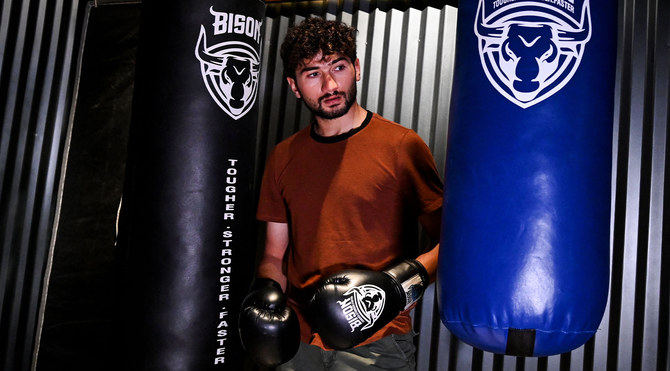LAHORE, Pakistan: Pakistani mountaineer Shehroze Kashif faces sub-zero temperatures and biting winds in his race to scale the world’s highest peaks, but his biggest challenge is finding the money.
Kashif, 21, aims this year to become the youngest person to climb every peak above 8,000 meters (26,247 feet), all of which are in Asia, with five in Pakistan.
Summiting Everest set him back around $60,000, and climbing all 14 “super peaks” can cost hundreds of thousands of dollars — funds that are especially difficult to raise in a country gripped by an economic crisis.
“My father sold my car and a piece of land... that’s how I did Everest,” Kashif told AFP from his home in Lahore, the sub-tropical, low-altitude city where he was born.

This picture taken on June 27, 2023 shows mountaineer Shehroze Kashif posing for a photo next to his Guinness records certificates during an interview with AFP inside his home in Lahore.
Only around 50 people are believed to have climbed all 14 super peaks, the youngest being Mingma Gyabu “David” Sherpa of Nepal, who summited them all by age 30.
To break this record, Kashif still has three mountains to conquer: China’s Shishapangma, and Cho Oyu and Manaslu in Nepal, having to re-climb the latter after a new, higher summit was officially recognized in 2021.
Hot on Kashif’s heels is Adriana Brownlee, a 22-year-old British-Spanish mountaineer who is also racing to be the youngest to scale all the eight-thousanders.
Kashif describes Brownlee — the youngest woman to climb the world’s second-highest peak, K2 — as “sharing the same stage.”
But unlike Brownlee, who has climbed 10 eight-thousanders, Kashif does not have international sponsorship and said he even struggles to get backers in Pakistan.
Brownlee will also need to re-summit Manaslu, in what would be her third attempt to scale the peak since first climbing it.
“I think she’s waiting for me (to do it) actually,” Kashif said with a laugh.

This picture taken on June 27, 2023 shows mountaineer Shehroze Kashif displaying his picture on a phone during one of his expeditions, after an interview with AFP inside his home in Lahore. (AFP)
Kashif first became interested in climbing aged 11, when most Pakistani boys his age are building up their cricket skills.
Instead, he climbed the 3,885-meter Himalayan peak Makra in northern Pakistan.
He has racked up a string of records since then, with scarcely enough space in his Twitter bio to list them all.
Kashif is the youngest person to climb K2 and the youngest to climb both of the world’s two highest mountains.
He is also the youngest to climb Pakistan’s Broad Peak, the world’s 12th highest mountain and his first eight-thousander — a feat that earned him the moniker “Broad Boy.”
“It’s not about only climbing the mountains. It’s about the energy that you absorb from the mountains,” Kashif said.
“Every mountain has its own charm. Its own aura of... danger and adventure and happiness.”
With memorial plaques dotting the hills of the eight-thousanders, Kashif is aware of his pursuit’s risks.
“These guys were here with the same potential, same passion, same enthusiasm, same determination and same tolerance (as me),” he said.
Kashif’s most dangerous climb was up the world’s ninth-highest peak, Nanga Parbat, in July 2022.
He and his climbing partner Fazal Ali got lost in bad weather after summiting, and soon ran out of oxygen, food and water.
“I started hallucinating,” Kashif said. “My head was working (but the) rest of my body was just totally numb.”
When Kashif woke from a rest, he was surprised to be alive, and determined to survive. After six hours of trekking, the pair made it to one of the mountain’s base camps.
“The thing that I was most afraid of (is) that I don’t want to die without knowing what my body is capable of.”


















